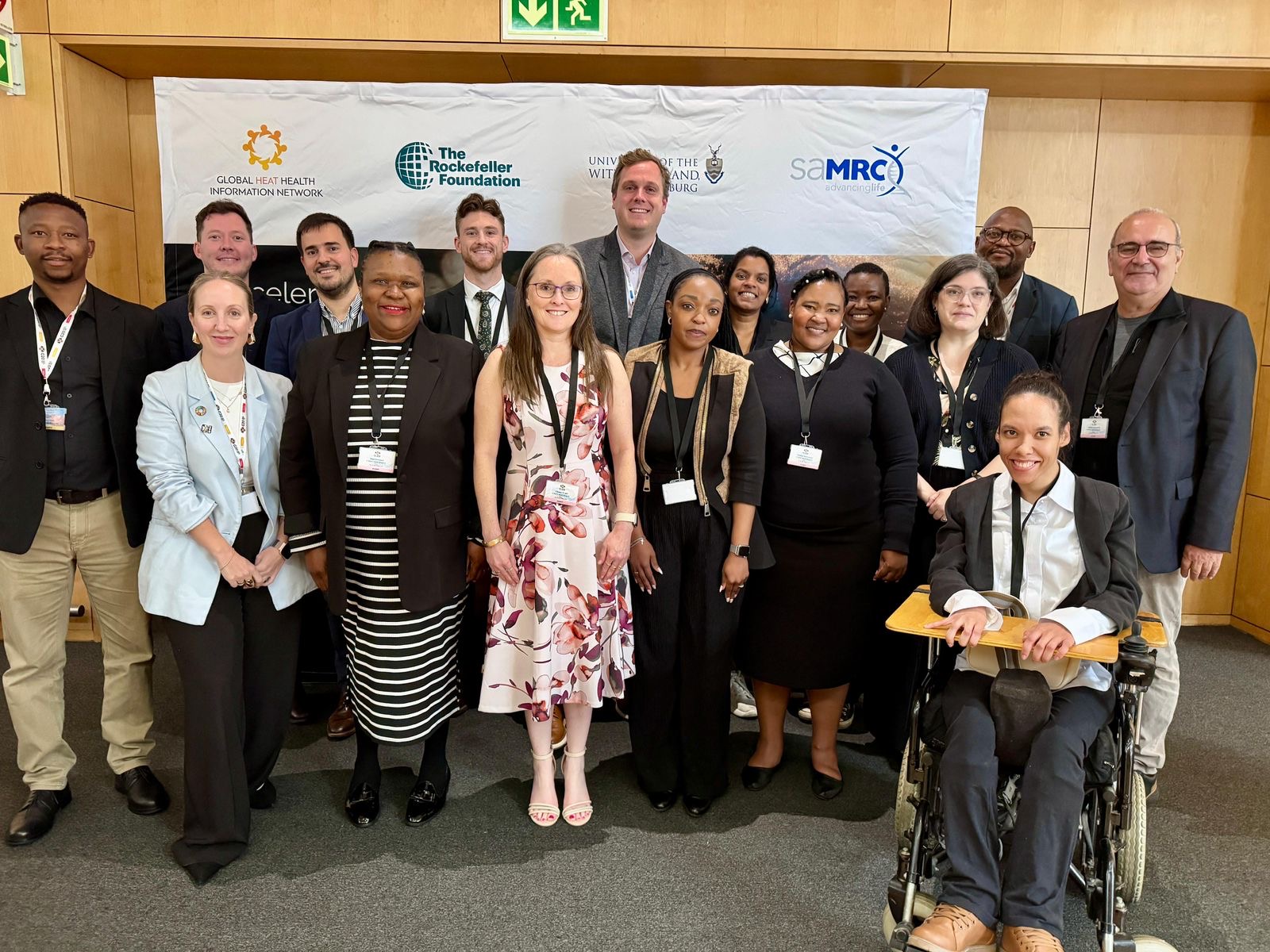Advancing Heat Resilience Through Science and Collaboration: GHHIN’s Engagement in South Africa
Published: October 17, 2025
—
Last week experts from across science, health, and policy gathered in South Africa for a series of high-level events focused on tackling the growing risks of extreme heat. The week marked a milestone for integrating heat resilience into global and regional climate discussions, with the Global Heat Health Information Network (GHHIN) actively contributing to shaping the conversation across multiple platforms, together with South Africa Medical Research Council (SAMRC), WITS RHI, and The Rockefeller Foundation.
At the G-STIC Conference in Cape Town, the session “Extreme Heat, Smart Responses” brought together researchers, practitioners, and policymakers from South Africa, Australia, and beyond to explore cutting-edge science and innovation for managing heat risks.

For the first time, heat and health featured prominently at this major science and technology conference. Representing the World Meteorological Organization (WMO) and GHHIN, Technical Support Unit Coordinator Alejandro Saez Reale joined a panel alongside Dr. Anban Pillay, Deputy Director-General at the South African National Department of Health, and other leading experts to discuss how applied science and data innovation can drive life-saving policy action.
“Connecting science and policy is essential,” said Saez Reale. “When researchers and policymakers come together from the start, evidence becomes more policy-relevant, and policies more evidence-based.”
The discussions continued at a G20 Environment and Climate Sustainability Working Group side event, “Accelerating Climate-Resilient Development Through Science-Driven Action to Reduce Heat Vulnerability.” The session, organized by the South African Medical Research Council (SAMRC), Wits RHI, and GHHIN with support from The Rockefeller Foundation, featured presentations from the National Department of Health, the Department of Forestry, Fisheries and Environment, UNICEF, WITS RHI, and officials from City of Cape Town.
“The Rockefeller Foundation is supporting communities and their leaders to take lifesaving, cost effective, climate-informed health action” said Greg Kuzmak, Director, Health at The Rockefeller Foundation, when speaking at the event, “part of this effort includes supporting the science-to-policy interface, ensuring that health system interventions in response to heat are based on the latest science and evidence.”
South Africa’s Department of Forestry, Fisheries and Environment shared how the country is advancing climate governance through multiple acts and strategies, including scenario modelling for future climate impacts in partnership with the South African Weather Service. Sectoral impact modelling is also underway, beginning with agriculture, water, and health.
The South African National Department of Health outlined their National Heat Health Action Guidelines, designed to support provinces and municipalities in developing coordinated preparedness and response measures. These are complemented by a Climate Change and Adaptation Strategy (2020–2025) and municipal-level risk and vulnerability assessments, now completed across all 52 municipalities in the 9 provinces.
Representatives from the City of Cape Town shared data showing an observed rise in high-heat days, with the city expected to become hotter and drier in the coming decades. Spatial data and citizen science are being used to map heat island risks and inform targeted interventions, while technology and innovative planning approaches are helping to protect residents and reduce exposure.
The session also presented findings from the new report Heat-Related Health Risks and Responses in G20 Countries, which synthesizes evidence on heat impacts, adaptation measures, and governance responses, underscoring the urgent need for coordinated, science-based heat action across the world’s largest economies.
It presented key findings from a new report on Heat-Related Health Risks and Responses in G20 Countries, which synthesizes evidence on heat impacts, adaptation measures, and governance responses, underscoring the urgent need for coordinated, science-based heat action across the world’s largest economies.
“This side event is an excellent opportunity to bring together G20 as well as BRICS countries to set a new agenda that tackles heat-related health impacts and sets the stage for identifying interventions that will save lives,” said Prof. Caradee Wright, Chief Specialist Scientist leading the Climate Change and Health Research Programme at the SAMRC and member of the GHHIN Management Committee.
Following the policy dialogue, GHHIN participated in a technical workshop on advancing heat-health research and translational science, aimed at identifying scientific priorities to extend human heat tolerance and strengthen climate adaptation efforts. Alejandro Saez Reale presented GHHIN’s Global Scientific Synthesis Report on Extreme Heat and Health (forthcoming), highlighting the importance of aligning research with policy needs and identifying gaps that hinder effective heat action.
During the workshop, Bradley Riley of the World Bank commented on a project underway in three South African cities (Johannesburg, Tshwane and Ekurhuleni in Gauteng Province), where his team is supporting the development of local Heat Action Plans informed by heat mapping and citizen science. Mr Riley also mentioned ‘The Unlivable Series’ regional reports on heat and health.
The week concluded with a field visit organized by the City of Cape Town, where participants explored the city’s Green Infrastructure Programme in action, by visiting the municipal tree nursery, Green Point Park, and ongoing initiatives on occupational safety and public health under the city’s Heat Action Plan. The visit offered practical insights into how cities are integrating heat resilience into urban planning and service delivery.
Together, these engagements reaffirmed the importance of cross-sectoral collaboration in building climate-resilient health systems and communities. They also underscored GHHIN’s ongoing role in translating science into action and supporting countries in strengthening their governance, preparedness, and protection against extreme heat.